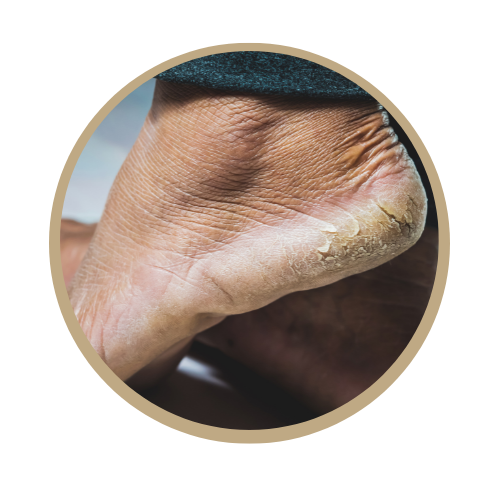Ancaster Foot Fixer and Orthotics Clinic
Callus Care/Cracked Heel
Callus Care/Cracked Heel
Calluses and Cracked heels are common foot issues that often result from a combination of factors, including pressure, friction, and dry skin. Here's an explanation of each condition and how they can be addressed:
Callus Care:
What are Calluses? Calluses are areas of thickened, toughened skin that form in response to repeated pressure or friction. They often develop on the soles of the feet, particularly on weight-bearing areas like the heels or balls of the feet.
Causes:
- Pressure and Friction: Prolonged pressure or friction, often from ill-fitting shoes or repetitive activities, can lead to callus formation.
- Biomechanical Issues: Foot deformities, such as bunions or hammertoes, can contribute to callus development.
- Lack of Cushioning: Inadequate cushioning in shoes can increase pressure on specific areas of the feet.
How to Help:
- Footwear: Choose well-fitting shoes with proper cushioning and support to reduce pressure on vulnerable areas.
- Regular Moisturizing: Keep the skin hydrated with regular use of moisturizers to prevent excessive dryness.
- Pumice Stone or File: Gently use a pumice stone or foot file to reduce the thickness of the callus.
- Orthotic Inserts: Custom or over-the-counter orthotic inserts can help distribute pressure more evenly across the foot.
- Padding: Use padding or cushions in shoes to reduce friction on callused areas.
Cracked Heels Care:
What are Cracked Heels? Cracked heels, or heel fissures, occur when the skin on the heels becomes dry, thickened, and begins to split. This can result in painful or deep cracks.
Causes:
- Dry Skin: Lack of moisture, especially in dry or cold climates, can lead to dry and cracked skin.
- Excessive Pressure: Prolonged standing or walking, particularly on hard surfaces, can contribute to heel cracks.
- Biomechanical Factors: Abnormalities in foot structure or gait can increase the risk of heel fissures.
- Obesity: Excess body weight can add pressure on the heels.
- Medical Conditions: Conditions like diabetes or thyroid disorders can affect skin health.
How to Help:
- Hydration: Keep the feet well-hydrated by regularly applying a thick moisturizing cream, especially after bathing.
- Soaking: Soak the feet in warm water to soften the skin before gently exfoliating with a pumice stone.
- Proper Footwear: Wear shoes with good heel support and avoid open-back shoes that may exacerbate the problem.
- Use of Foot Creams: Utilize creams or ointments containing urea or salicylic acid to promote skin softening.
- Avoid Harsh Soaps: Use mild soaps to prevent further drying of the skin.
- Regular Foot Checks: Keep an eye on your feet for any signs of cracks or changes, and seek professional care if needed.
In both cases, if the calluses or cracked heels persist, or if there are signs of infection, it's advisable to consult with a chiropodist or healthcare professional. They can provide personalized recommendations and treatments to address the underlying causes and promote overall foot health


